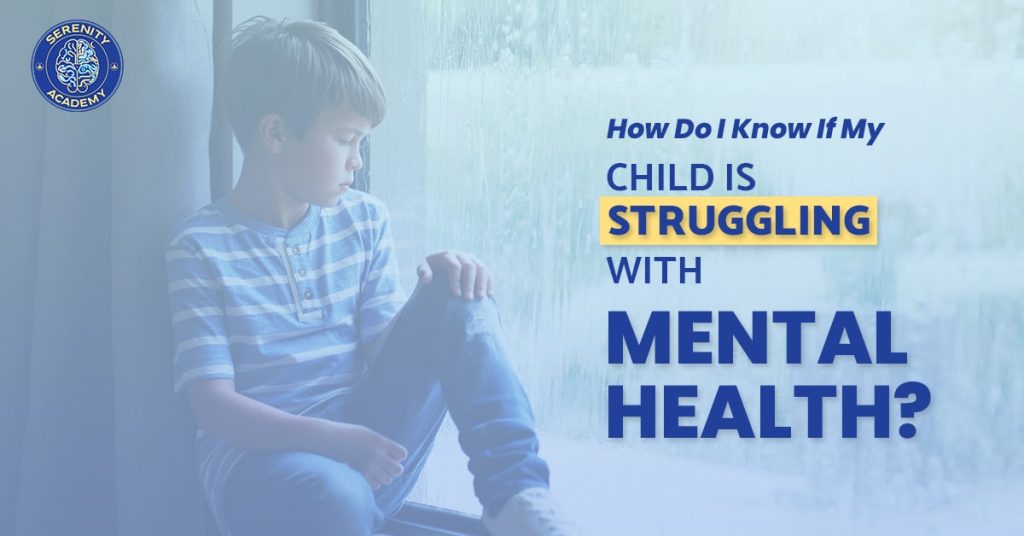This blog highlights the importance of recognising mental health struggles in children. It outlines common indicators such as behavioural changes, physical symptoms, emotional stress, social isolation, and school-related issues. Early intervention is vital for achieving better outcomes, and the blog stresses the role of parents, guardians, and educators in identifying these signs. It also discusses when to seek help from a child psychiatrist, outlining treatment options like therapy, medication, and support groups. Finally, the blog offers tips for supporting children’s mental health at home and emphasizes the expertise of SERENITY ACADEMY in providing professional care.
Table of Contents
Introduction
Mental health issues affect not just adults; children, too, can experience significant emotional and psychological distress. With the ever-evolving demands of modern life, children are now more vulnerable to mental health disorders than ever before. Recognizing the signs early on is essential, as timely intervention can significantly improve outcomes. As a parent, guardian, or educator, knowing what to look for and when to seek professional help is important.
In this blog, we will explore the common indication of mental health struggles in children and when it might be time to connect with a child psychiatrist.
Mental Health Struggles in Children : Common Indicators
Children may not always be able to express their emotions verbally, so their distress often manifests in other ways. Here are some of the critical signs that may indicate a mental health issue:
1. Behavioral Changes
Behavioral changes are often one of the initial signs that something may be wrong. How your child reacts to stressful or uncomfortable situations can reveal a lot about their emotional state. A child experiencing mental distress may:
- Display sudden mood swings, shifting from calm to angry or upset in a short time.
- Withdraw from activities they previously enjoyed, showing signs of disinterest or low energy.
- Act out in ways that seem disproportionate to the situation, such as throwing tantrums over minor issues.
- Show a decline in academic performance, with less focus and productivity.
These behavioral shifts are red flags, especially if they persist over time. While occasional moodiness or irritability is normal for children, consistent changes in behavior that impact their daily lives warrant closer attention.
2. Physical Symptoms
It is easy to overlook physical symptoms as signs of mental distress, but the mind and body are deeply interconnected. Some children express their emotional struggles through physical complaints, including:
- Consistent headaches or stomach aches with no apparent medical cause.
- Complaints of constant fatigue, even after sufficient rest.
- Unexplained aches and pains that persist without an injury.
Sometimes, the child may not be aware that these physical symptoms are tied to their emotional state. For example, a child might complain of stomach pain when feeling anxious about going to school, or they may frequently ask to stay home from activities they previously enjoyed.
3. Emotional Stress
Children are not immune to the pressures and stresses that adults face. In fact, they may be more vulnerable because they have fewer coping mechanisms and life experiences. Emotional distress in children can manifest through:
- Excessive worry or fear about situations that may not seem threatening to others.
- Outbursts of anger, often over minor issues that do not seem proportionate to the reaction.
- Intense sadness or hopelessness that lasts for an extended period.
If your child seems overwhelmed by emotions like anger, sadness, or anxiety for a prolonged period, it might be time to consider seeking help. A pattern of these emotional responses can affect their ability to function in daily life and may indicate a deeper problem.
4. Social Isolation
Social relationships are critical to a child’s development. If you notice that your child is withdrawing from friends, family, or activities they once enjoyed, this could be a sign of underlying emotional or psychological struggles. Indicators of social isolation include:
- Spending more time alone, avoiding family gatherings or playdates.
- Resistance to attending school or joining extracurricular programs.
- Lack of interest in talking with friends or interacting with peers.
Isolation may result in increased feelings of loneliness and exacerbate existing mental health issues like depression or anxiety. It is essential to monitor your child’s social interactions and ensure they have opportunities to engage with others.
5. Problems at School
School can be a major source of stress for children, and academic or social problems at school often signal mental health struggles. Watch for signs like:
- A sudden drop in grades or difficulty focusing on schoolwork.
- Behavior problems in the classroom, such as frequent disruptions or defiance.
- Complaints about bullying or conflicts with teachers or peers.
School should be a place where children feel safe and supported. If your child consistently reports problems at school or shows a reluctance to attend, this might be a sign of deeper emotional issues.
Understanding the Importance of Early Intervention
Recognizing these early signs can make a notable difference in your child’s mental health journey. When mental health issues are identified and addressed early, treatment is often more effective, and the child can learn healthy coping mechanisms before the problem worsens. As a parent or guardian, your role in this process is crucial.
You might feel uncertain about when to seek professional help, but it is always better to err on the side of caution. Mental health experts can help assess your child’s needs and develop a plan tailored to their situation.
Seeking Help from a Child Psychiatrist
If you notice persistent signs of mental distress in your child, connecting with a child psychiatrist or psychologist is a major step. These professionals specialize in understanding and treating mental health issues in children. They can evaluate your child’s behavior, emotional state, and overall well-being, guiding the best action.
Treatment might include:
- Counselling or therapy: A therapist can help your child understand their feelings and develop effective methods for handling challenges.
- Medication: In certain situations, medication may be recommended to manage symptoms, such as anxiety or depression.
- Support groups: Engaging with peers who are going through similar experiences can give your child a sense of community and understanding.
Supporting Your Child at Home
In addition to seeking professional help, there are multiple ways you can assist your child’s mental health at home:
- Open communication: Motivate your child to talk about their emotions and let them know it is all right to ask for guidance.
- Routine and structure: Children thrive on routine. Maintaining consistent daily schedules can provide a sense of security.
- Encourage healthy habits: Encourage your child to get plenty of sleep, maintain a healthy balanced diet, and engage in physical activity, as these are all essential to mental well-being.
Conclusion
The mental health of your child is as essential as their physical health. By being vigilant and recognizing the signs of mental distress early, you can take proactive steps to support their emotional well-being. Remember, you do not have to navigate this journey alone—reach out to professionals for guidance and support.
At SERENITY ACADEMY, we specialize in providing high quality care for children facing mental health challenges. Our team of experienced professionals is here to help your child develop the tools they need to thrive emotionally and mentally. If you are worried about your child’s mental well-being, do not hesitate to contact us for a consultation today.

